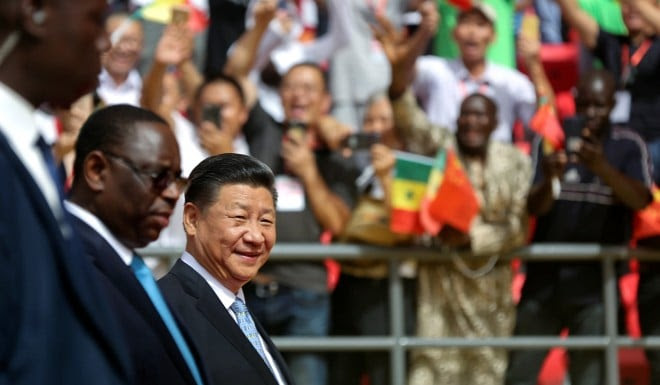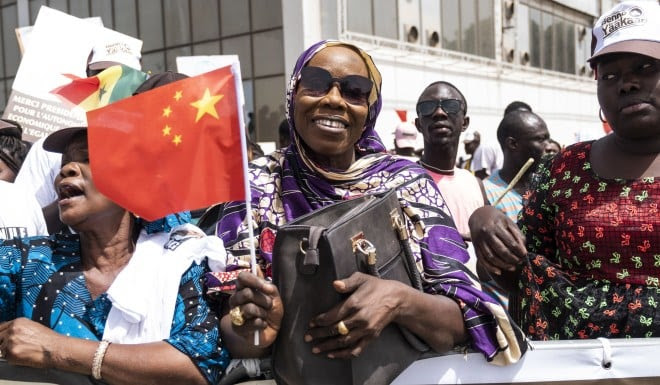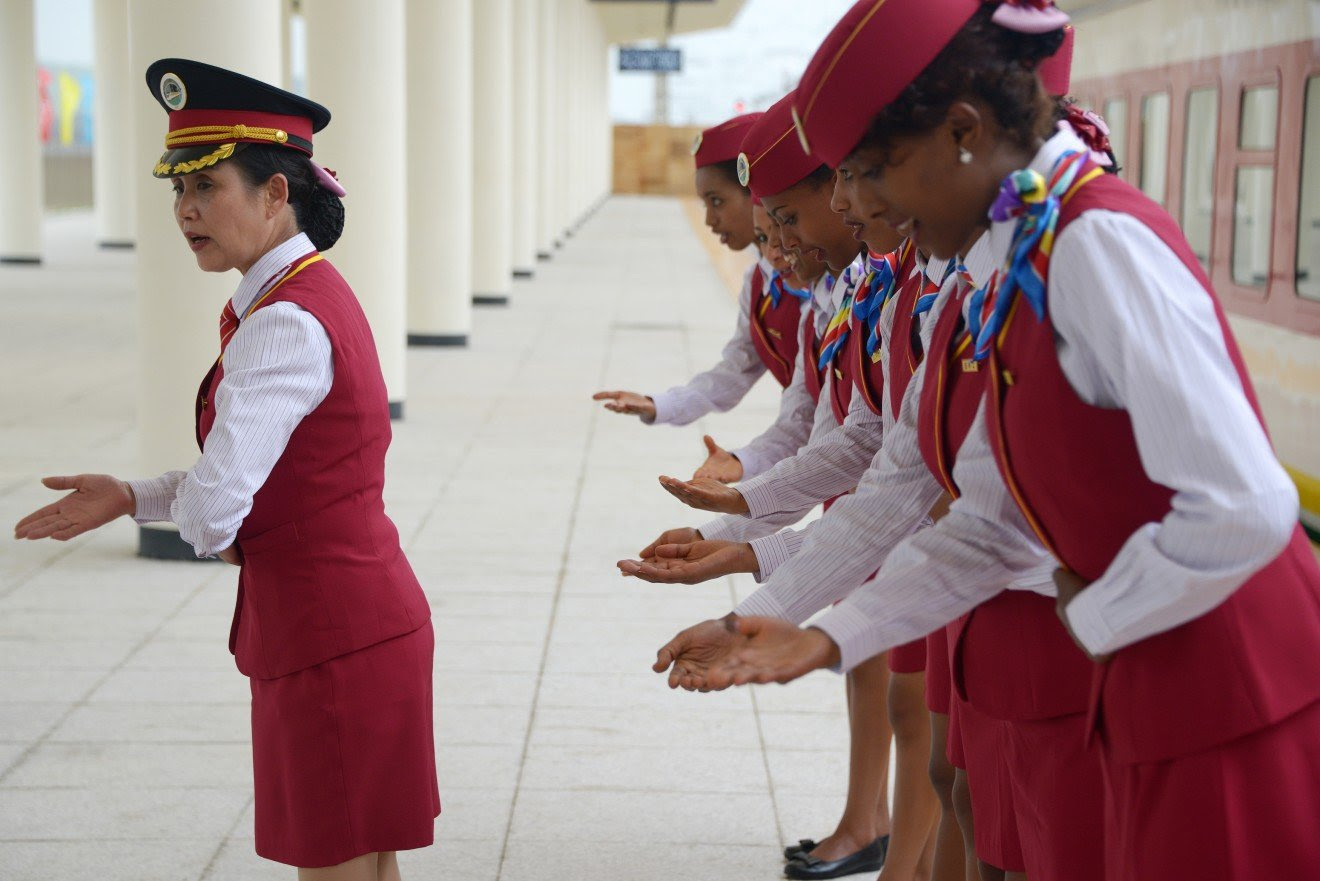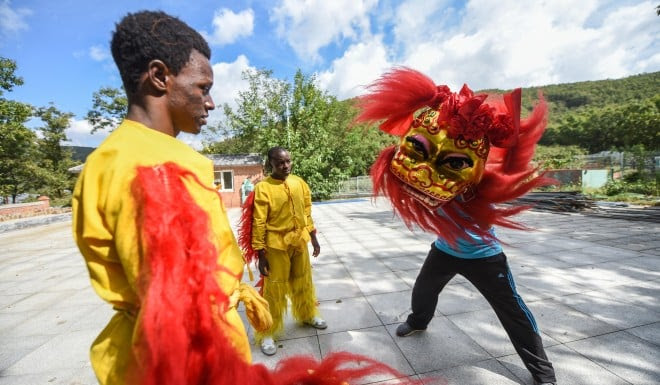Chinese
President Xi Jinping has just finished his fourth official trip to
Africa. And yet again, he’s returned promising tens of billions more in
investment.
President Xi Jinping has just finished his fourth official trip to
Africa. And yet again, he’s returned promising tens of billions more in
investment.
Xi has just completed a 10-day visit to four African countries, as well as the United Arab Emirates,
on his first international trip after being appointed president for a
second, and unlimited, term. Donald Trump has yet to set foot on the
continent as president.
on his first international trip after being appointed president for a
second, and unlimited, term. Donald Trump has yet to set foot on the
continent as president.
Beijing
is expanding its presence across the continent by building railways,
deploying troops and offering more than $100 billion in loans, leading
to fears that China is taking a neocolonialist approach to the continent
for the sake of its own interests.
is expanding its presence across the continent by building railways,
deploying troops and offering more than $100 billion in loans, leading
to fears that China is taking a neocolonialist approach to the continent
for the sake of its own interests.

Senegal’s President Macky Sall and Xi Jinping attends the opening
ceremony of a China-built wrestling arena in Senegal’s capital Dakar on
July 22.
Photo: Reuters/Mikal McAllister
ceremony of a China-built wrestling arena in Senegal’s capital Dakar on
July 22.
Photo: Reuters/Mikal McAllister
Here’s what you need to know about Xi’s latest trip and the deepening ties between China and Africa.
What goodies did China bring this time?
Not all the deals made during Xi’s visit have been made public. Here are the ones we know about so far:
South
Africa was promised nearly $15 billion of investment, which includes
loans to state companies and the construction of a metallurgical
complex. China had already invested a total of $25 billion in South
Africa by the end of 2017.
Africa was promised nearly $15 billion of investment, which includes
loans to state companies and the construction of a metallurgical
complex. China had already invested a total of $25 billion in South
Africa by the end of 2017.
Senegal
became the first West African state to join China’s Belt and Road
Initiative, although the precise level of investment remains unknown.
Beijing has invested a total of more than $100 billion in the
multinational, multi-continent infrastructure program aimed at promoting
trade and economic cooperation.
became the first West African state to join China’s Belt and Road
Initiative, although the precise level of investment remains unknown.
Beijing has invested a total of more than $100 billion in the
multinational, multi-continent infrastructure program aimed at promoting
trade and economic cooperation.

Senegal residents welcome Xi Jinping in capital city Dakar after the Chinese president arrives on July 21.
Photo: AP/Xaume Olleros
Photo: AP/Xaume Olleros
Rwanda,
one of the world’s poorest countries, got loans and grants worth
millions of dollars. The 15 deals signed with Beijing include road
construction, hospital renovation and the development of a new airport,
according to Nairobi-based newspaper The East African.
one of the world’s poorest countries, got loans and grants worth
millions of dollars. The 15 deals signed with Beijing include road
construction, hospital renovation and the development of a new airport,
according to Nairobi-based newspaper The East African.
Mauritius,
a small island nation off the East African coast, continued
negotiating Africa’s first free trade agreement with China.
a small island nation off the East African coast, continued
negotiating Africa’s first free trade agreement with China.
Why is China handing out all this money?
First,
the money is not free, but in the form of cheap loans. Critics have
accused China of trapping the African states with massive debts – which
could take the struggling economies decades, if not longer, to pay off.
the money is not free, but in the form of cheap loans. Critics have
accused China of trapping the African states with massive debts – which
could take the struggling economies decades, if not longer, to pay off.
Other nations to which China has loaned money for the Belt and Road Initiative are already finding themselves struggling to make their payments.
Second,
most of the infrastructure projects funded by these loans are awarded
to China’s state-owned companies. These contracts have been creating
jobs and revenue for China as well.
most of the infrastructure projects funded by these loans are awarded
to China’s state-owned companies. These contracts have been creating
jobs and revenue for China as well.

A Chinese rail conductor trains Ethiopian attendants at a railway
station in Ethiopia in 2016. China built a railway linking the Ethiopian
capital of Addis Ababa and the port of Djibouti as part of the Belt and
Road Initiative.
Photo: Xinhua/Sun Ruibo
station in Ethiopia in 2016. China built a railway linking the Ethiopian
capital of Addis Ababa and the port of Djibouti as part of the Belt and
Road Initiative.
Photo: Xinhua/Sun Ruibo
Third,
the loans tend to come come packaged with China’s military and cultural
programs, allowing Beijing to expand its hard and soft power.
the loans tend to come come packaged with China’s military and cultural
programs, allowing Beijing to expand its hard and soft power.
China’s first and only overseas military base is in Djibouti, in the Horn of Africa. Beijing is also running more than 50 Confucius Institutes across Africa to promote Chinese language and culture.
Strong
ties with Africa will also give Beijing an edge in accessing the
continent’s natural resources, such as oil and rare minerals.
ties with Africa will also give Beijing an edge in accessing the
continent’s natural resources, such as oil and rare minerals.
What does Africa think?
Africa wants to industrialize, and China is offering its help, even if it comes with strings attached.
As
of 2009, China has replaced the US as Africa’s top trading partner.
Although the US still engages in anti-terrorism drills and other
security operations across the continent, the Trump administration has
spent little time talking about helping with trade and business.
of 2009, China has replaced the US as Africa’s top trading partner.
Although the US still engages in anti-terrorism drills and other
security operations across the continent, the Trump administration has
spent little time talking about helping with trade and business.
By contrast,
Beijing has positioned itself as a friend that is supporting the
African economy. Former US Secretary of State Rex Tillerson disputed that stance while on a trip to Africa – the same trip on which he was fired.
Beijing has positioned itself as a friend that is supporting the
African economy. Former US Secretary of State Rex Tillerson disputed that stance while on a trip to Africa – the same trip on which he was fired.

Zimbabwe and Nigerian trainees learn lion dance in the Chinese city
of Dalian as part of a China-Africa cultural exchange event in 2016.
Photo: Xinhua/Pan Yulong
of Dalian as part of a China-Africa cultural exchange event in 2016.
Photo: Xinhua/Pan Yulong
African
governments have been looking for inspiration from China’s
transformation from a raw materials exporter to the world’s factory,
Deborah Brautigam, a China-Africa relations expert at the Johns Hopkins
University, wrote in an analysis published in the Washington Post.
governments have been looking for inspiration from China’s
transformation from a raw materials exporter to the world’s factory,
Deborah Brautigam, a China-Africa relations expert at the Johns Hopkins
University, wrote in an analysis published in the Washington Post.
To
develop their manufacturing sectors, the countries first need to have
proper roads, rail lines and port facilities – and these are what China
is building now.
develop their manufacturing sectors, the countries first need to have
proper roads, rail lines and port facilities – and these are what China
is building now.
Beijing
has also brought in Chinese firms to the special economic zones it has
established in Africa. Such economic zones have been major drivers of
China’s own economic boom over the past four decades.
has also brought in Chinese firms to the special economic zones it has
established in Africa. Such economic zones have been major drivers of
China’s own economic boom over the past four decades.



